| SHADOWS ON THE WALL | REVIEWS | NEWS | FESTIVAL | AWARDS | Q&A | ABOUT | TALKBACK | |||||
 Shadows off the beaten path Shadows off the beaten pathIndies, foreign, docs and shorts...
On this page:
EVIL DOES NOT EXIST |
ME CAPTAIN [Io Capitano] |
SOCIETY OF THE SNOW
| |||||
| See also: SHADOWS FILM FESTIVAL | Last update 9.Nov.23 | |||||
|
Evil Does Not Exist Review by Rich Cline | 
| |||||
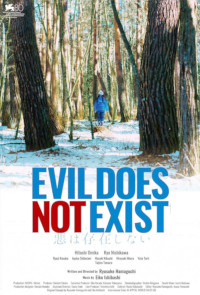 dir-scr Ryusuke Hamaguchi prd Satoshi Takada with Hitoshi Omika, Ryo Nishikawa, Ryuji Kosaka, Ayaka Shibutani, Hazuki Kikuchi, Hiroyuki Miura, Yuto Torii, Taijiro Tamura, Yoshinori Miyata release UK Oct.23 lff, US Oct.23 afi 23/Japan 1h46 VENICE FILM FEST TORONTO FILM FEST   Is it streaming? |
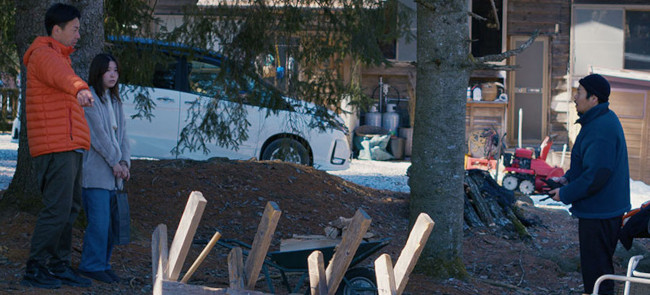 Both beautiful and challenging, this Japanese drama cleverly draws the audience in with an astute eye for details and characters that are hilariously deadpan in their interaction. Expanding on the evocative music of Eiko Ishibashi, writer-director Ryusuke Hamaguchi observes scenes with skill and insight, drawing out deeper meanings without us even realising it. So while the film feels somewhat enigmatic, it gets under the skin and lingers. In a small village in a wooded area outside Tokyo, Takumi (Omika) keeps himself busy with various aspects of local life, instilling his curiosity about people and nature in his independent 8-year-old daughter Hana (Nishikawa). When marketers Takahashi and Mayuzumi (Kosaka and Shibutani) arrive for a public consultation on a proposed glamping park, Takumi leads the pointed questions that dismantle their plan. But their boss tells them that they must persevere, so they return with a gift for Takumi, which he dismisses, and a willingness to learn, which he wryly accepts. Plotting is offhanded, as the focus remains on the interaction and underlying motivations of the various characters. The film quietly explores the interconnections between these people and the wildlife in the woods around them, most notably deer that have a trail through the campsite. Takumi helps cafe workers gather spring water for their udon dishes, which is now threatened by the campsite's septic tank. And a recurring reference to wounded deer fighting for their lives adds resonance to the unsettling, open-handed final sequence. Performances have a terrific matter-of-fact quality that sparks amusing humour in most situations, making these fully formed people engaging and intriguing. With a magnetic presence, Omika is particularly dry in the central role, beautifully dismissing those he finds useless. And Kosaka and Shibutani make a superb duo of interlopers, each with personal desires and opinions that feed into their work and the way they respond to whatever comes at them. Their openness in the face of their harshly business-minded boss is played with striking subtlety. Where this film goes is deliberately provocative, leaving the audience with a series of echoing ideas and themes relating to animal instinct. The precise camerawork, earthy writing and subdued performances combine to create a gorgeous picture of humanity, as the script grapples with community, identity, ambition and greed in ways that feel almost lighter than air. It's not for audiences who like to be spoon-fed with story or messages. But the way the film forces us to think is sublime.
| ||||
|
Me Captain Io Capitano Review by Rich Cline |  MUST
MUST  SEE SEE
| |||||
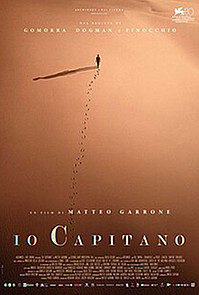 dir Matteo Garrone prd Paolo Del Brocco, Matteo Garrone scr Matteo Garrone, Massimo Gaudioso, Massimo Ceccherini, Andrea Tagliaferri with Seydou Sarr, Moustapha Fall, Issaka Sawadogo, Hichem Yacoubi, Bamar Kane, Didier Njikam, Doodou Sagna, Affif Ben Badra, Joseph Beddelem, Oumar Diaw, Princess Erika, Mariam Kaba release It 7.Sep.23, US Oct.23 afi 23/Italy Rai 2h01 VENICE FILM FEST  Is it streaming? |
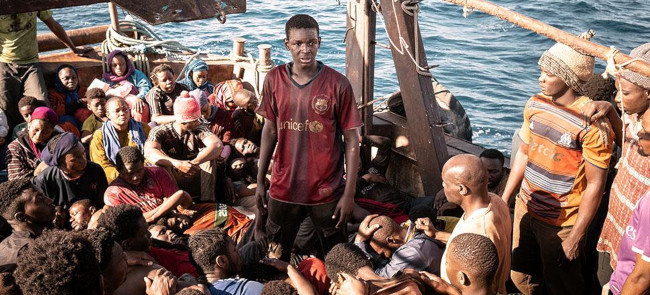 Taking a bracingly naturalistic approach, Italian filmmaker Matteo Garrone traces the immigrant journey from Wast Africa to Europe, drawing riveting details and perspective from a powerful true story. Intensely personal, the film finds global resonance in its specific story of a 16-year-old whose innate hopefulness is beaten and battered but never extinguished over the course of an astonishing odyssey. This gives the film a soaring humanity that's vitally important. In Dakar, Senegal, teen Seydou (Sarr) and his cousin Moussa (Fall) have secretly saved up cash so they can escape to Europe to become musical stars. Bright sparks, they sneak away without telling their mothers, after dismissing the horror stories others recount to them. But reality is even harsher as they travel through Mali and Niger, and there's worse to come while crossing the Sahara to Libya's coast. Along the way, they face opportunists, bandits and militias who steal their money, torture them and sell them into slavery. But with unexpected help they carry on. Skilfully capturing the various cultures of western and northern Africa along with the characters' big personalities, the film pulls the audience in with the shared experiences these people have together. This creates a sense of camaraderie that's a humane antidote to the cruelty others inflict on them. So while there are some extremely harrowing scenes, there's also an undercurrent of communal resilience. And it's captured beautifully by cinematographer Paolo Carnera, while Andrea Farri's terrific score includes songs by Sarr and Fall. With his alert, soulful eyes and striking physicality, first-time actor Sarr is a hugely engaging lead, allowing the audience to experience each high and low, right to the moment he is pushed to take the helm as the boat's captain across the Mediterranean, fully understanding the responsibility he bears for these frightened families. And Sarr's connection with Fall has a terrific spark to it, which transforms beautifully into tenderness. Each side player creates a fully formed character who has his or her own inner life. These layers of experience resonate through each scene, creating an immersive cinematic approach that's unusually involving. And seeing everything through Seydou's observant eyes eliminates the politics, putting true humanity, or the lack of it, at the centre of a situation in which compassion is the only valid response. By recounting this story so vividly from a new perspective, Garrone has made a gripping film that bristles with tenacity and hope.
| ||||
|
Society of the Snow La Sociedad de la Nieve Review by Rich Cline |  MUST
MUST  SEE SEE
| |||||
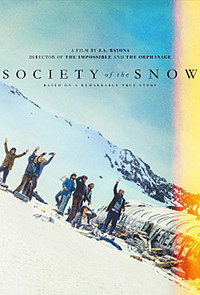 dir JA Bayona prd Belen Atienza, Sandra Hermida scr JA Bayona, Nicolas Casariego, Jaime Marques, Bernat Vilaplana with Enzo Vogrincic, Agustin Pardella, Matias Recalt, Rafael Federman, Esteban Bigliardi, Simon Hempe, Andy Pruss, Alfonsina Carrocio, Santiago Vaca Narvaja, Paula Baldini, Felipe Gonzalez Otano, Iair Said release Sp 15.Dec.23, US 4.Jan.24 23/Spain Netflix 2h24 VENICE FILM FEST  Is it streaming? |
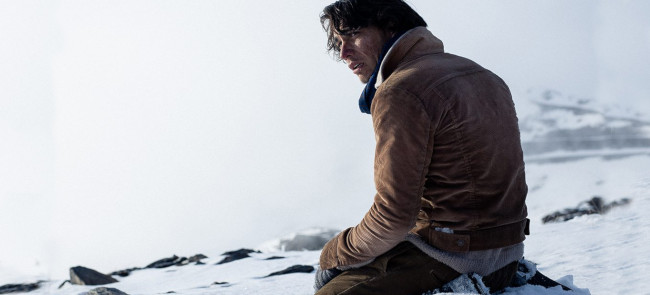 Taking on another momentous true story (see The Impossible), Spanish filmmaker JA Bayona finds a visceral, authentically immersive path through a retelling of the 1972 plane crash that stranded Uruguayan rugby players high in the Chilean Andes. Through a series of harrowing events, the film pulls the audience into the emotional complexity of a situation far beyond what we can imagine. It's bracingly involving, riveting and ultimately cathartic. After crashing on a glacier in the Andes, survivors wait expectantly for rescue. Many are around 20 years old, members of a Uruguayan rugby team travelling with family and friends to Chile. Their food runs out quickly in this icy, desolate place, and as the days and weeks pass, many die of their injuries and hunger. Out of desperation, they resort to eating the dead to survive, fully aware of what this means. And various members of the group head out looking for options, finding moments of hope and despair over a mind-boggling 72 days. Recounting events through the eyes of 24-year-old Numa (Vogrincic) gives the audience a potent point of view. Feeling like an outsider, he's a natural leader who rises to the challenge. His soulful perspective allows us to feel every element, from shivering cold to agonising grief, plus the disturbing moral questions. Cinematographer Pedro Luque creates engulfing authenticity, including a strong period-setting prolog and the staggering crash, augmented by Michael Giacchino's beautifully localised score. It's in the faces of these superb young actors that the story grabs hold, refusing to let go right into the intensely moving final sequence, which echoes the haunting unity between those who survived and the dead who saved their lives. As Numa, the Vogrincic has a magnetic expressive physicality, finding wonderful chemistry with his costars. Each actor creates a brightly specific character, with standouts including Pardella's Nando and Recalt's med-student Roberto. These are young men with their lives ahead of them, willing themselves to stay alive against all hope. Even if these events have been dramatised before, this is an unusually internalised and realistic film, using firsthand accounts to add detail while delving into deeper, darker complexities. This eliminates the sensationalism, shifting the focus to the resilience of the 16 (of 45) who survived and an almost holy sense of honouring the dead. This film can't help but make us examine our own reactions, so it becomes moving in ways that feel revolutionary.
| ||||

See also: SHADOWS FILM FESTIVAL © 2023 by Rich Cline, Shadows
on the Wall
HOME | REVIEWS | NEWS | FESTIVAL | AWARDS
| Q&A | ABOUT | TALKBACK | | ||||

